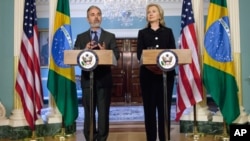U.S. Secretary of State Hillary Clinton and Brazilian Foreign Minister Antonio Patriota announced the new Open Government Partnership, an international coalition of countries and civil society organizations committed to increasing government openness, strengthening accountability, and enhancing civic engagement. The official launch of the Open Government Partnership will take place on the margins of the United Nations General Assembly in September.
"We envision the Open Government Partnership," said Secretary Clinton, "as a network of support for those leaders and citizens working to bring more transparency and accountability to governments worldwide." Participating governments will develop and implement country-specific commitments around five “grand challenges,” including improving public services, increasing public integrity, more effectively managing public resources, increasing corporate accountability and creating safer communities. Governments will develop and assess country action plans in close consultation with civil society. An international steering committee made up of eight governments and nine leading civil society representatives will oversee the partnership.
"There is an undeniable connection between how a government operates and whether its people flourish," said Secretary Clinton. "When a government invites its people to participate, when it is open as to how it makes decisions and allocates resources, when it administers justice equally and transparently, and when it takes a firm stance against corruption of all kinds, that government is ... far more likely to succeed in designing and implementing effective policies and services."
Openness in government is also an important factor in promoting economic growth. "Countries committed to defending transparency and fighting corruption," said Secretary Clinton, "are often more attractive to entrepreneurs." So, at a time when global competition for trade and investment is intense, openness is not just good for governance, it is also good for a sustainable growth.
Governments that have gained the trust of their people are able to generate tax revenues to fund sustainable development progress. Brazil has certainly found this to be the case, as it has expanded its tax base, spread those resources broadly, and strengthened its democratic institutions.
Likewise, countries from Kenya to Estonia are employing open source software to bring best-in-class technology and tools to their processes and practices. Such modernization of democratic governance is the ultimate goal of the Open Government Partnership—creating stronger linkages between a government and its people.
The challenge ahead will be for countries to make commitments to strengthen openness and accountability and to fulfill those commitments in the months ahead.
Open Government Partnership

Participating governments will develop and implement country-specific commitments around five “grand challenges.”



